AI-Guided Anatomical Landmark and Abnormality Detection for Autonomous Endoscopy Examination
Md Shakhawat Hossain, Munim Ahmed, Md Sahilur Rahman, Mahreen Tabassum, Fariha Karim, Md Aulad Hossain, Razib Hayat Khan, Razib Hayat Khan, M. M. Mahbubul Syeed and Mohammad Faisal Uddin
Journal of Computer Science , Vol. 20 (8) , pp. 858-871

Abstract
Endoscopy is the routine medical procedure to observe tumors in the human Gastrointestinal (GI) tract by inserting an endoscope, a thin, flexible, tube-like instrument with a light source and camera. Traditionally, an endoscopist performs the endoscopy, orients the endoscope within these structures and navigates this through the help of familiar anatomical landmarks to reach the abnormalities and mark them. Identifying landmarks and abnormalities is critical for the maneuver and the success of endoscopy, which is related to the patient’s comfort, injury and accurate diagnosis. The manual naked-eye-observation maneuver and examination are highly challenging, take a long time and often cause discomfort to the patients and the endoscopists. As a result, several AI-based landmark detection methods have been proposed recently to facilitate autonomous endoscopy examination. However, these methods lack accuracy and consider only limited landmarks. This study presents a Data-efficient image Transformer (DeiT)-based method to detect anatomical landmarks and anomalies for autonomous endoscopy. The proposed method detected 23 landmarks and anomalies from the entire GI tract with 99% accuracy and precision, outperforming the state-of-the-art (91%). Moreover, this method took only 0.045 sec to identify a landmark. The phi coefficient (0.997) indicated a strong positive association between the proposed method and clinical ground truth. Strong association, high accuracy and rapid speed ensured the reliability of the proposed method for autonomous endoscopy examination.
Citation
Md Shakhawat Hossain, Munim Ahmed, Md Sahilur Rahman, Mahreen Tabassum, Fariha Karim, Md Aulad Hossain, Razib Hayat Khan, Razib Hayat Khan, M. M. Mahbubul Syeed and Mohammad Faisal Uddin. "AI-Guided Anatomical Landmark and Abnormality Detection for Autonomous Endoscopy Examination." Journal of Computer Science 20.8 (2024): 858-871.
BibTeX
@article{pub19_2024,
title={AI-Guided Anatomical Landmark and Abnormality Detection for Autonomous Endoscopy Examination},
author={Md Shakhawat Hossain, Munim Ahmed, Md Sahilur Rahman, Mahreen Tabassum, Fariha Karim, Md Aulad Hossain, Razib Hayat Khan, Razib Hayat Khan, M. M. Mahbubul Syeed and Mohammad Faisal Uddin},
journal={Journal of Computer Science},
volume={20},
number={8},
pages={858-871},
year={2024},
doi={https://doi.org/10.3844/jcssp.2024.858.871}
}
Publication Details
2024
Journal of Computer Science
20
8
858-871
Share
Related Publications

Ripen Banana Dataset: A Comprehensive Resource for Carbide …
Elman Alam, Md Tarequl Islam, Ishrat Zahan Raka, Onamika Sarkar Ritu, Md Shakha…

A Comprehensive Dataset of Surface Water Quality Spanning 1…
Md Rajaul Karim, MM Mahbubul Syeed, Ashifur Rahman, Khondkar Ayaz Rabbani, Kani…

Predicting the effect of Bevacizumab therapy in ovarian can…
Md Shakhawat Hossain, Munim Ahmed, Md Sahilur Rahman, MM Mahbubul Syeed, Mohamm…
